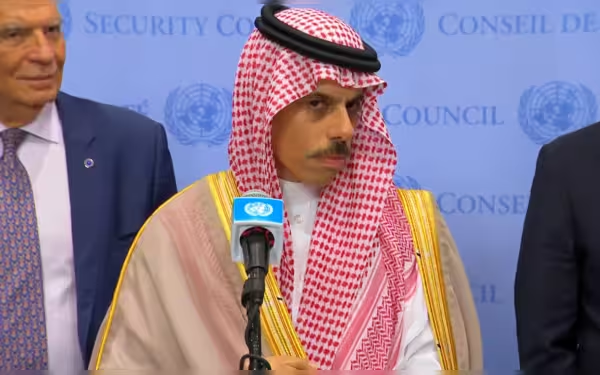Saturday, November 16, 2024 07:57 PM
Saudi Arabia Leads Coalition for Two-State Solution in Israeli-Palestinian Conflict
- Saudi Arabia forms global alliance for two-state solution.
- Prince Faisal emphasizes need for dialogue and ceasefire.
- Escalating violence raises concerns over regional stability.
 Image Credits: arabnewspk
Image Credits: arabnewspkSaudi Arabia and allies push for a two-state solution to the Israeli-Palestinian conflict, emphasizing dialogue and the need for a ceasefire.
In recent developments, Saudi Arabia and its allies have taken significant steps to address the long-standing Israeli-Palestinian conflict. The focus is on promoting a two-state solution, which aims to establish a sovereign Palestinian state alongside Israel. This initiative is rooted in the belief that a lasting peace can only be achieved through mutual recognition and coexistence.
On Thursday, Saudi Foreign Minister Prince Faisal bin Farhan announced the formation of a global alliance dedicated to advancing this agenda. He emphasized that the coalition's efforts would include essential building blocks, such as enhancing the capabilities of the Palestinian authority. This approach reflects a comprehensive strategy to ensure that the Palestinian leadership is equipped to engage in meaningful negotiations.
Prince Faisal highlighted the importance of dialogue, stating, “What we are trying to do is build a coalition aimed at implementing the two-state solution.” He also expressed his confusion over the ongoing violence, questioning, “I fail to understand how the continuation of war can be the only option.” His remarks underscore the urgent need for a ceasefire and a return to diplomatic discussions.
The conflict has escalated dramatically since October 7, when Hamas militants launched an attack on Israeli settlements, resulting in significant casualties. In retaliation, Israel has conducted extensive military operations in Gaza, leading to a tragic loss of life and widespread destruction. The situation has further complicated regional dynamics, with tensions spilling over into Lebanon, where Hezbollah has been engaged in hostilities against Israel.
World leaders are increasingly concerned about the potential for a broader conflict, particularly if Iran becomes more involved. Despite calls from the United States and France for a halt to hostilities, Israeli Prime Minister Benjamin Netanyahu has rejected these proposals, leaving many to wonder about the future of peace efforts.
Prince Faisal expressed surprise at Netanyahu's response to the ceasefire proposal, indicating that the Saudi-led coalition had carefully considered the interests of both Lebanon and Israel in their approach. He noted, “We have seen since the start of the war a pattern, every time we are told we are close to a ceasefire in Gaza, it does not happen.” This statement reflects the frustration felt by many in the international community regarding the lack of progress in achieving peace.
As the situation continues to evolve, Saudi Arabia remains committed to laying the groundwork for a viable solution. The focus on establishing a Palestinian state is not just a political maneuver; it is a crucial step towards ensuring stability and security in the region. The hope is that through sustained dialogue and cooperation, a path to peace can be forged, allowing both Israelis and Palestinians to coexist in harmony.
The pursuit of a two-state solution is a complex and challenging endeavor, but it is one that holds the promise of a brighter future for both peoples. As the world watches closely, the actions taken by Saudi Arabia and its allies could very well shape the course of history in the Middle East. The call for diplomacy and a ceasefire is not merely a plea for peace; it is a necessary step towards healing the wounds of conflict and building a foundation for lasting coexistence.













